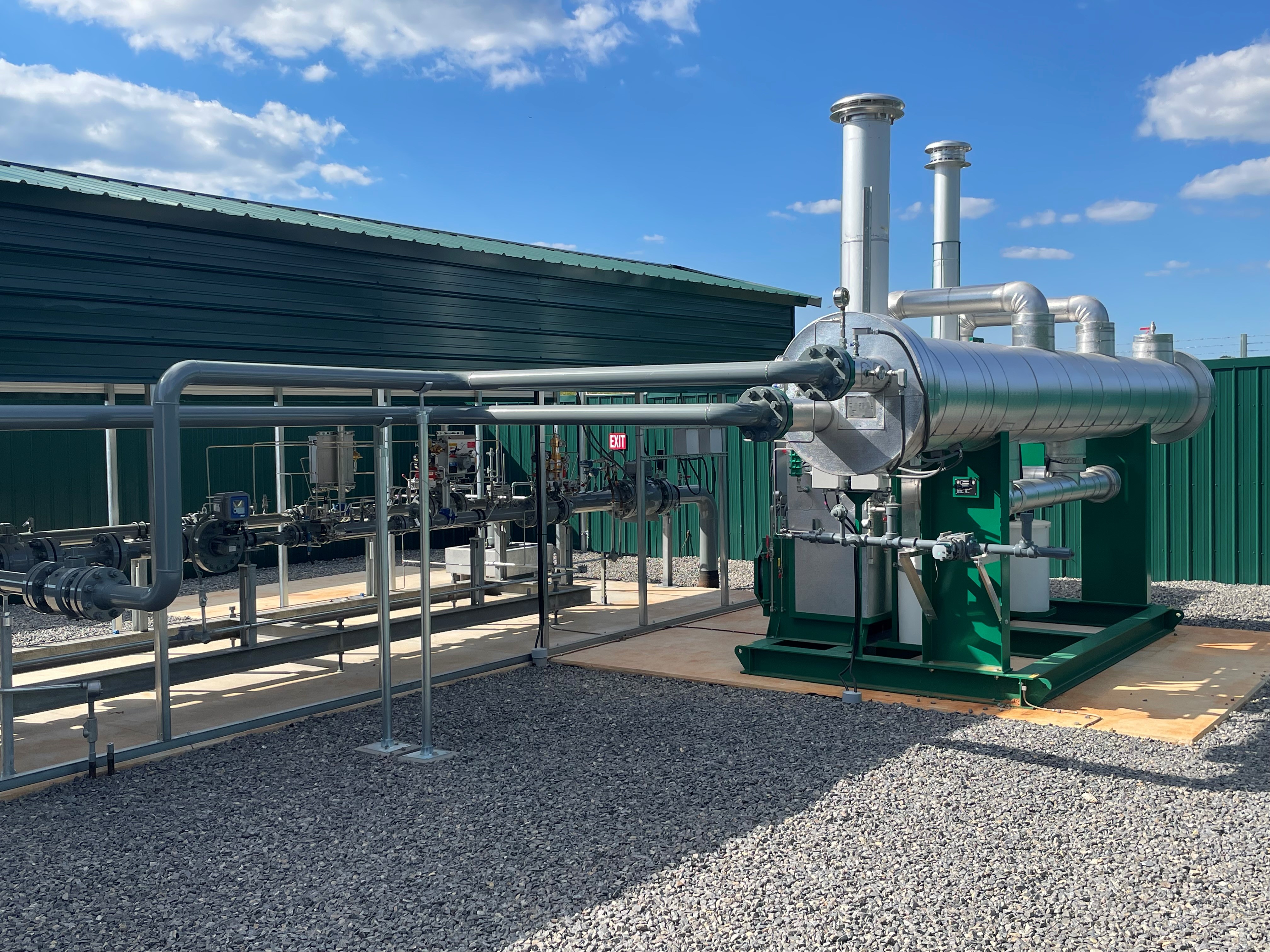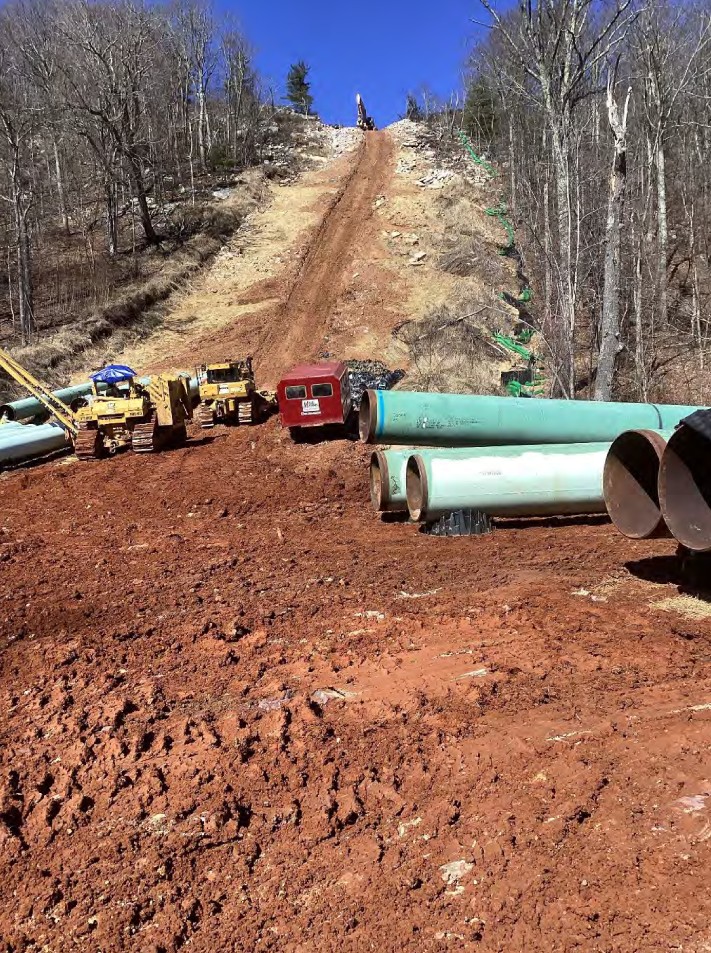With natural gas flowing through the Mountain Valley Pipeline after a decade of controversy, a utility has its sights set on expanding its services.
Roanoke Gas is using the pipeline’s additional capacity and favorable geography to deliver natural gas to Franklin County’s Summit View Business Park, which officials say is likely to boost development there.
It’s also in early talks to explore connecting Rocky Mount to the Roanoke Gas system, which would bring natural gas to the Franklin County town of nearly 5,000 people.
The utility is finally able to act on these plans now that the 303-mile, 42-inch diameter pipeline is operational and capable of bringing up to 2 billion cubic feet of gas daily from West Virginia through six Virginia counties.
The pipeline was originally slated to be built in four years, but both its timeline and cost more than doubled as it faced opposition from landowners and activists who opposed the project’s use of eminent domain to acquire property, raised concerns about its impact on the environment and questioned the durability of the pipe itself.
Through years of legal and political battles, Mountain Valley Pipeline’s backers maintained that the pipeline was necessary to meet a growing demand for energy. The increased supply that it now brings will help boost growth in the Roanoke region, local officials say.
“There was never any question to us that the Mountain Valley was needed to alleviate the supply constraints,” Roanoke Gas President and CEO Paul Nester said in an interview. 
The region taps a new source of gas
Roanoke Gas, founded in 1883, has more than 63,700 customers. Commercial and industrial clients make up about 10% of its customer base but account for about two-thirds of the gas delivered. Its largest customer currently is the cement maker Titan America, but the Steel Dynamics plant in Roanoke sometimes holds that title. Carilion Clinic comes in third.
The company is a subsidiary of the publicly traded RGC Resources Inc., which has the smallest ownership stake out of five joint owners of the Mountain Valley Pipeline, at less than 1%. The largest is Pittsburgh-based EQT Corp. The way RGC Resources is organized, Roanoke Gas as a subsidiary is a customer of the pipeline but does not itself hold an ownership stake.
For decades, Roanoke Gas received gas from the south and west from two sources, the East Tennessee and Columbia pipelines. With the Mountain Valley Pipeline beginning operations on June 14, it now has another input.
“We finally have the third source that we lobbied for for so long,” Nester said.
To put the Mountain Valley Pipeline’s 2 billion cubic foot daily capacity into perspective, Roanoke Gas delivers about 10 billion cubic feet across its entire system each year.
“So in five days, Mountain Valley can move that much energy by capacity through that pipe,” Nester said. “It’s really remarkable.”
Roanoke Gas is contracted to buy about 15 million cubic feet each day — a sip from a firehose — but the utility’s equipment could accommodate far more future demand.
The utility receives Mountain Valley Pipeline gas in two places, called taps.
The Lafayette tap just inside Montgomery County, at the Roanoke County line, delivers gas into the utility’s whole system.
“We have been taking gas from Mountain Valley into Roanoke proper since June 14,” Nester said. “We already had the pipe constructed to do all that and really have been making those plans since 2017.”
The additional supply will come at a lower price and is expected to save customers money, Nester said. By law in Virginia, natural gas utilities pass on the cost of gas directly to consumers as it goes up and down.
“In the wintertime here in Roanoke, we’ll take as much as we can through this Lafayette station, really to lower the price for the customer and to supplement the system,” he said.
Not all of the company’s gas will come from the Mountain Valley Pipeline, but the addition of the cheaper gas is expected to lower the overall price, said Tommy Oliver, Roanoke Gas’ vice president of regulatory affairs and strategy.
“The blended rate should get lower,” he said.
Roanoke Gas’ second Mountain Valley connection, called the Franklin tap, brings gas to Franklin County’s Summit View Business Park, which spans 550 acres off U.S. 220 between Rocky Mount and Boones Mill.
“Franklin County has never had natural gas until now,” Nester said.
The reasons boiled down to logistics and economics. At only 8 inches in diameter, the East Tennessee pipeline that runs just south of Roanoke couldn’t deliver more gas, and it wouldn’t be economical to build a new pipe from it to Rocky Mount, he said.
The Mountain Valley Pipeline, however, runs southeast through Franklin County, and its path passes to the east of Rocky Mount. That makes delivering gas to Summit View Business Park a reality, and it opens up the possibility of connecting Rocky Mount.
“Mountain Valley broke all those barriers. Obviously, plenty of gas, plenty of energy, which is fantastic, but it broke the geography barrier too,” Nester said.
The utility has spoken with Rocky Mount officials about building a new tap on Mountain Valley east of the town and coming in from that direction, likely along Virginia 40, rather than trying to run pipe from Summit View south to Rocky Mount.
“Simply put, we think the easement and right of way would be cleaner, less intrusive certainly on the population, but also the digging would be easier and cleaner,” Nester said. “All of that adds up to affordability at the end of the day.”
Working out the necessary rights of way could involve a combination of properties owned by private landowners, the state or the Rocky Mount and Franklin County governments, said Rocky Mount Town Manager Robert Wood.
While the town has met with Roanoke Gas executives, no formal proposals have been brought to the town council for consideration yet. Even if the idea meets with the necessary approvals, it’s likely a few years away.
Nonetheless, Wood said that he expects the town’s residential, commercial and industrial customers could one day see “significant savings” if gas becomes available. Generally speaking, natural gas is typically cheaper than propane and electricity for heating homes and businesses.
“Especially on the industrial side, that’s the one where it can make a really big difference in the bottom line for industrial customers,” Wood said.
Officials see business growth opportunity
One of Roanoke Gas’ newer industrial customers is Stik-Pak, a manufacturer that moved into a new 50,000-square-foot facility in the Summit View Business Park in 2021.

The company makes flexible packaging for dry, powdered food products — for example, think of the single-serving drink packets you pour into a bottle of water and shake up to make a sports drink.
The company has 130 employees across three shifts. Up until now, it’s been burning a lot of propane to keep the temperature stable and provide hot water.
“We are a climate-controlled facility because we are food grade,” said Shay Whitlow, Stik-Pak’s director of human resources and safety.
Stik-Pak is in the process of hooking up to Roanoke Gas’ Franklin tap at the business park and hopes it will provide cost savings as well as always-on reliability for the building, which runs shifts 24 hours a day during weekdays but keeps the temperature steady seven days a week.
“If we run out of the propane, then we have to wait for it to be filled. … That has been the case once or twice before when we first started up here,” Whitlow said. “But with the natural gas, it’s going to be on demand, it’s going to be right here and we don’t have to wait, which could hinder our facility.”
Those benefits could draw other companies to Summit View.
“With the amount of gas that we have at Summit View available, it’s a huge asset in general,” said Dani Poe, Franklin County’s economic development director.
Currently, Stik-Pak and ValleyStar Credit Union are the only occupants of the business park. Herbal tea maker Traditional Medicinal announced in 2020 that it would establish a manufacturing facility there; the company still is in talks to move in, Poe said.
The park has room for more businesses, including at what Poe said is one of the only 100-acre available sites in the region. Officials also hope to complete a connector road through the park by the end of December, are working to increase the park’s sewer capacity using a recently awarded $5.5 million state grant and are upgrading the electric infrastructure there.
“These enhancements will provide job opportunities and foster community growth in the years to come,” Poe said.
Nester said Summit View has “a very special situation to have that much energy literally right at their park.”
“We believe there’s nowhere else in this region — and I actually believe really in the Eastern United States, and possibly the Western United States, too, but certainly in the Eastern — that has as much gas availability as Summit View. Easy access coming through that big pipe,” he said.
There’s so much gas available through the Franklin tap, Nester said, that they’ll be able to serve any business customers who come to the park while also making plans to run gas lines to nearby residents or down U.S. 220 to businesses in that area.
“What we normally do is survey an area,” Oliver said. “Depending on the feedback, if it makes economic sense to run a line there, we would run it.” 
Pipeline has been controversial for years
Getting natural gas from the Marcellus and Utica shale formations in Appalachia into the Mountain Valley Pipeline took more than twice as long and cost more than twice as much as originally planned.
The pipeline was first announced in 2014 with a price tag of $3.5 billion and an estimated completion date of 2018. By the time it finally began operating 10 years later, the cost had risen to about $7.85 billion.
What came between the goal and the reality was a swell of resistance, including from landowners whose property was seized through eminent domain, environmentalists concerned about the project’s impact on endangered species and the overall climate, and, eventually, safety activists who said years of delays had weakened the pipes as they sat out exposed to the elements.
The battle reached the U.S. Supreme Court and the halls of Congress. In June 2023, lawmakers gave the Mountain Valley Pipeline a big boost by fast-tracking government permits it needed; that green light came in a provision of a bill whose main purpose was to avoid a national debt-ceiling crisis.
Today, the gas is moving, but the job isn’t done. Crews are still working on returning land impacted by pipeline construction to its previous state as much as possible, removing equipment and installing measures to control sediment and erosion.
The Mountain Valley Pipeline has a history of erosion and stormwater control violations, along with the fines to go with them. In late 2019, the project agreed to pay $2.15 million to resolve a lawsuit from the Virginia Department of Environmental Quality. In the past year, the DEQ has fined the pipeline nearly $100,000 more for violating state environmental regulations in connection with that 2019 consent agreement.
While the pipeline has now been operating for more than three months, opponents say they still have concerns. Federal agencies cleared the project for operation before the gas was turned on, but critics said that decision was hastily made.
As a recent example, they cite the May 1 rupture of a pipe in Roanoke County during hydrostatic testing, in which highly pressurized water is pushed through a pipeline to test its integrity. A report commissioned by Mountain Valley Pipeline and released Aug. 28 blamed a manufacturer’s defect in an elbow fitting — not corrosion from years of exposure to sun and weather, as some had feared — and said it was an isolated incident, but that did little to allay the worries of the pipeline’s opponents, who say it shows that the project used shoddy materials.
“This is yet more evidence of the threat MVP poses to everyone along the route, and why the government never should have greenlit this corrupt project,” said Russell Chisholm, a Giles County resident and co-director of the Protect Our Water, Heritage, Rights (POWHR) Coalition.
And pipeline opponents are continuing their fight on another front, trying to stop a proposed $370 million, 31-mile MVP Southgate extension from the Pittsylvania County compressor station, where the main Mountain Valley Pipeline ends, into North Carolina.
For their part, Mountain Valley Pipeline’s developers have called the main project “among the most environmentally scrutinized projects to be built in this country, having been subject to an unprecedented level of legal and regulatory review.” They have said it’s necessary to supply reliable and affordable energy to markets across the mid-Atlantic and southeastern U.S.
Locally, Nester said the additional supply is necessary to meet growing demand from the businesses that comprise the region’s top natural gas consumers.
“Right now there simply is not a substitute for the amount of natural gas they use for their manufacturing, fabricating, or in the case of the hospitals, their heating and laundry needs,” Nester said.
More energy will mean more growth in the area, Nester said.
“We’re excited. There’s opportunities in Franklin County for the existing citizenry, businesses, and certainly future economic development’s very bright there,” Nester said.
Or, as Jim Palasota, Stik-Pak’s chief operating officer, put it during an interview from his office in the Summit View Business Park: “We’re anticipating neighbors soon.”



